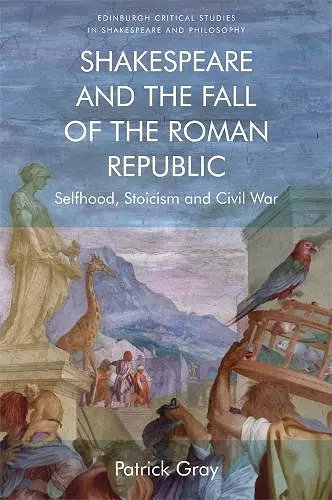Shakespeare and the Fall of the Roman Republic
Selfhood, Stoicism and Civil War
Format:Paperback
Publisher:Edinburgh University Press
Published:17th Sep '20
Currently unavailable, and unfortunately no date known when it will be back

Explores Shakespeare's representation of the failure of democracy in ancient Rome Shakespeare and the Fall of the Roman Republic introduces Shakespeare as a historian of ancient Rome alongside figures such as Sallust, Cicero, St Augustine, Machiavelli, Gibbon, Hegel and Nietzsche. In Julius Caesar and Antony and Cleopatra, Shakespeare shows Rome’s transition from Republic to Empire. Why did Rome degenerate into an autocracy? Alternating between ruthless competition, Stoicism, Epicureanism and self-indulgent fantasies, Rome as Shakespeare sees it is inevitably bound for civil war. Shakespeare and the Fall of the Roman Republic considers Shakespeare’s place in the history of concepts of selfhood and reflects on his sympathy for Christianity, in light of his reception of medieval Biblical drama, as well as his allusions to the New Testament. Shakespeare’s critique of Romanitas anticipates concerns about secularisation, individualism and liberalism shared by philosophers such as Hannah Arendt, Alasdair MacIntyre, Charles Taylor, Michael Sandel and Patrick Deneen. Key Features: Explains Shakespeare’s interpretation of the underlying causes of the Roman Republican civil warsShows how Shakespeare uses Roman history as a testing-ground to arbitrate between competing claims about human natureArticulates Shakespeare’s distinctive, compromise position on selfhoodSituates Shakespeare within the intellectual history of individualism, Christianity, Romanticism, secularization, and political liberalism
Gray’s penetrating eye for textual analysis, his vast and versatile erudition and his extreme sensitivity for the depths of the complexity of the human mind result in gripping new insights into two plays that, it turns out, we did not know as well as we thought. -- Domenico Lovascio, Università degli Studi di Genova * Early Modern Literary Studies *
Patrick Gray's new book pulls together a wealth of up-to-date Shakespeare criticism, classical literature, theology, philosophy and theory into a fluent argument which bears on the deepest possibilities of self and society. The lucid case it makes is still relevant today: Shakespeare's Roman plays point over the horizon towards a more sympathetic and communal culture. * Ewan Fernie, The Shakespeare Institute, University of Birmingham Stratford-upon-Avon *
mark[s] the emergence of a new and excitingly different voice in Shakespeare studies. -- Andrew Hadfield, University of Sussex * Renaissance Quarterly Vol. LXXI I I , No. 1 *
ISBN: 9781474427463
Dimensions: unknown
Weight: 460g
320 pages